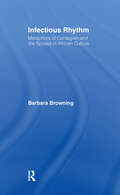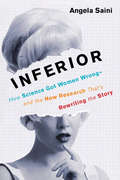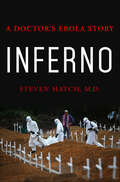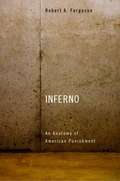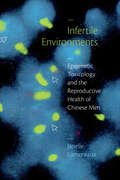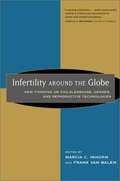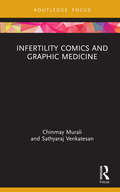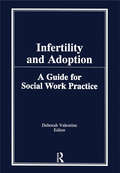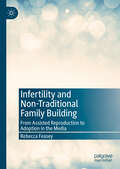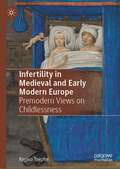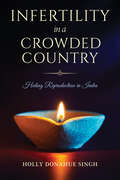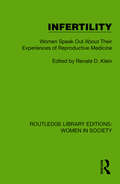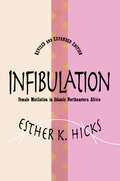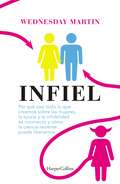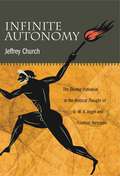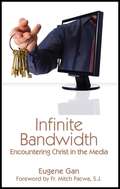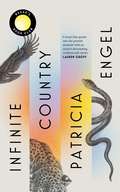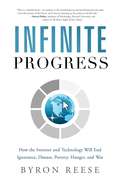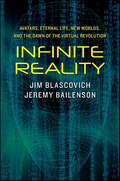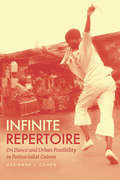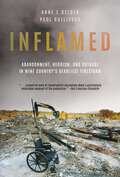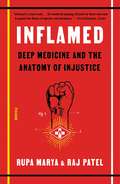- Table View
- List View
Infectious Rhythm: Metaphors of Contagion and the Spread of African Culture
by Barbara BrowningBarbara Browning follows the trail of "infectious rhythm" from the ecstatic percussion of a Brazilian carnival group to the eerily silent video image of the LAPD beating a man like a drum. Throughout, she identifies the metaphoric strain of contagion which both celebrates the diasporic spread of African culture, and serves as the justification for its brutal repression. The essays in this book examine both the vital and violent ways in which recent associations have been made between the AIDS pandemic and African diasporic cultural practices, including religious worship, music, dance, sculpture, painting, orature, literature and film. While pointing to the lengthy and complex history of the metaphor of African contagion, Browning argues that in its politicized, life-affirming embodiment, the figure might actually teach us to respond to epidemia humanely.
Inferior: How Science Got Women Wrong-and the New Research That's Rewriting the Story
by Angela SainiWhat science has gotten so shamefully wrong about women, and the fight, by both female and male scientists, to rewrite what we thought we knewFor hundreds of years it was common sense: women were the inferior sex. Their bodies were weaker, their minds feebler, their role subservient. No less a scientist than Charles Darwin asserted that women were at a lower stage of evolution, and for decades, scientists—most of them male, of course—claimed to find evidence to support this.Whether looking at intelligence or emotion, cognition or behavior, science has continued to tell us that men and women are fundamentally different. Biologists claim that women are better suited to raising families or are, more gently, uniquely empathetic. Men, on the other hand, continue to be described as excelling at tasks that require logic, spatial reasoning, and motor skills. But a huge wave of research is now revealing an alternative version of what we thought we knew. The new woman revealed by this scientific data is as strong, strategic, and smart as anyone else.In Inferior, acclaimed science writer Angela Saini weaves together a fascinating—and sorely necessary—new science of women. As Saini takes readers on a journey to uncover science’s failure to understand women, she finds that we’re still living with the legacy of an establishment that’s just beginning to recover from centuries of entrenched exclusion and prejudice. Sexist assumptions are stubbornly persistent: even in recent years, researchers have insisted that women are choosy and monogamous while men are naturally promiscuous, or that the way men’s and women’s brains are wired confirms long-discredited gender stereotypes.As Saini reveals, however, groundbreaking research is finally rediscovering women’s bodies and minds. Inferior investigates the gender wars in biology, psychology, and anthropology, and delves into cutting-edge scientific studies to uncover a fascinating new portrait of women’s brains, bodies, and role in human evolution.
Inferno
by Robert A. FergusonAmerica's criminal justice system is broken. The United States punishes at a higher per capita rate than any other country in the world. In the last twenty years, incarceration rates have risen 500 percent. Sentences are harsh, prisons are overcrowded, life inside is dangerous, and rehabilitation programs are ineffective. Police and prosecutors operate in the dark shadows of the legal process--sometimes resigning themselves to the status quo, sometimes turning a profit from it. The courts define punishment as "time served," but that hardly begins to explain the suffering of prisoners. Looking not only to court records but to works of philosophy, history, and literature for illumination, Robert Ferguson, a distinguished law professor, diagnoses all parts of a now massive, out-of-control punishment regime. He reveals the veiled pleasure behind the impulse to punish (which confuses our thinking about the purpose of punishment), explains why over time all punishment regimes impose greater levels of punishment than originally intended, and traces a disturbing gap between our ability to quantify pain and the precision with which penalties are handed down. Ferguson turns the spotlight from the debate over legal issues to the real plight of prisoners, addressing not law professionals but the American people. Do we want our prisons to be this way? Or are we unaware, or confused, or indifferent, or misinformed about what is happening? Acknowledging the suffering of prisoners and understanding what punishers do when they punish are the first steps toward a better, more just system.
Inferno: A Doctor's Ebola Story
by Steven Hatch"Hatch packs a wealth of knowledge into the book...poignant." -Associated PressDr. Steven Hatch, an infectious disease specialist, first came to Liberia in November 2013 to work at a hospital in Monrovia. Six months later, several of the physicians he had served with were dead or unable to work, and Ebola had become a world health emergency. Inferno is his account of the epidemic that nearly consumed a nation, as well as its deeper origins.Hatch returned with the aid organization International Medical Corps to help establish an Ebola Treatment Unit. Alongside a devoted staff of expats and Liberians in a hastily constructed facility nestled into the jungle, Hatch witnessed the unit's physicians, nurses, other caregivers, and patients selflessly helping others, preserving hope in the face of fear, and maintaining dignity across the divide of health and illness. And, over repeated visits during the course of the outbreak, Hatch came to understand the Ebola catastrophe not only as a contagious virus but as a product of Liberia's violent history and America's role in it.Powerful and clear-eyed, Inferno not only explores a deadly virus and an afflicted country, but also reveals how the Ebola outbreak stoked nativist anxieties that were exploited for political gain in the United States and around the world. In telling one doctor's story, Inferno demonstrates how generations of inequality left Liberia vulnerable to crisis, and how similar circumstances might fuel another plague elsewhere. By understanding and alleviating those circumstances, Hatch writes, we may help smother the fire next time.
Inferno: An Anatomy of American Punishment
by Robert A. FergusonAn Open Letters Monthly Best Nonfiction Book of the YearAmerica’s criminal justice system is broken. The United States punishes at a higher per capita rate than any other country in the world. In the last twenty years, incarceration rates have risen 500 percent. Sentences are harsh, prisons are overcrowded, life inside is dangerous, and rehabilitation programs are ineffective. Looking not only to court records but to works of philosophy, history, and literature for illumination, Robert Ferguson, a distinguished law professor, diagnoses all parts of a now massive, out-of-control punishment regime.“If I had won the $400 million Powerball lottery last week I swear I would have ordered a copy for every member of Congress, every judge in America, every prosecutor, and every state prison official and lawmaker who controls the life of even one of the millions of inmates who exist today, many in inhumane and deplorable conditions, in our nation’s prisons.”—Andrew Cohen, The Atlantic“Inferno is a passionate, wide-ranging effort to understand and challenge…our heavy reliance on imprisonment. It is an important book, especially for those (like me) who are inclined towards avoidance and tragic complacency…[Ferguson’s] book is too balanced and thoughtful to be disregarded.”—Robert F. Nagel, Weekly Standard
Infertile Environments: Epigenetic Toxicology and the Reproductive Health of Chinese Men (Critical Global Health: Evidence, Efficacy, Ethnography)
by Janelle LamoreauxIn Infertile Environments, Janelle Lamoreaux investigates how epigenetic research into the effects of toxic exposure conceptualizes and configures environments. Drawing on fieldwork in a Nanjing, China, toxicology lab that studies the influence of pesticides and other pollutants on male reproductive and developmental health, Lamoreaux shows how the lab’s everyday research practices bring national, hormonal, dietary, maternal, and laboratory environments into being. She situates the lab’s work within broader Chinese history as well as the contemporary cultural and political moment, in which declining fertility rates and reproductive governance and technology are growing concerns. She also points to how toxicology in China is a transnational endeavor tied to both local conditions and international research agendas and infrastructures, which highlights the myriad scales and scope of epigenetic environments. At a moment of growing concerns about toxins, endocrine-disrupting chemicals, and climate change, Lamoreaux demonstrates that epigenetic research’s proliferation of environments produces new kinds of toxic relations that impact multiple generations of humans.
Infertility Around the Globe: New Thinking on Childlessness, Gender, and Reproductive Technologies
by Marcia C. Inhorn Frank Van BalenThis collection of essays breaks examines the global impact of infertility as a major reproductive health issue, one that has profoundly affected the lives of countless women and men. Based on original research by seventeen internationally acclaimed social scientists, it investigates the use of reproductive technologies in non-Western countries.
Infertility Comics and Graphic Medicine (Routledge Focus on Gender, Sexuality, and Comics)
by Sathyaraj Venkatesan Chinmay MuraliInfertility Comics and Graphic Medicine examines women’s graphic memoirs on infertility, foregrounding the complex interrelationship between women’s life writing, infertility studies, and graphic medicine. Through a scholarly examination of the artists’ use of visual-verbal codes of the comics medium in narrating their physical ordeals and affective challenges occasioned by infertility, the book seeks to foreground the intricacies of gender identity, embodiment, subjectivity, and illness experience. Providing long-overdue scholarly attention on the perspectives of autobiographical and comics studies, the authors examine the gendered nature of the infertility experience and the notion of motherhood as an ideological force which interpolates socio-cultural discourses, accentuating the potential of graphic medicine as a creative space for the infertile women to voice their hitherto silenced perspectives on childlessness with force and urgency. This interdisciplinary volume will be of interest to scholars and students in comics studies, the health humanities, literature, and women’s and gender studies, and will also be suitable for readers in visual studies and narrative medicine.
Infertility and Adoption: A Guide for Social Work Practice
by Deborah P ValentineThis compassionate book brings together for the first time issues about infertility and adoption. Fifteen to 20 of all married couples in the United States are infertile, and most people have intense psychological and emotional reactions to the experience of infertility. Infertility and Adoption provides a clear understanding of the historical and social context of infertility, its emotional impact, and the process of coping with infertility. A prototype for conducting psychosocial assessments with infertile couples is provided. Practitioners, researchers, and administrators will learn about the latest trends in preparing adoptive parents for the arrival of their child. The multidisciplinary appeal of this book will reach professionals in social work and mental health and better prepare all of those who work with the growing number of individuals touched by infertility.
Infertility and Non-Traditional Family Building: From Assisted Reproduction to Adoption in the Media
by Rebecca FeaseyThis book examines the representation of infertility, assisted reproduction, miscarriage, adoption and surrogacy in a wide range of media, including blogs, vlogs, social media posts and factual programming. In so doing, it illustrates how pregnancy loss, involuntary childlessness and non-traditional mothering are being depicted across the media landscape. Whilst the topic of motherhood has emerged as a significant area of academic debate, narratives of unsuccessful or unconventional mothering have remained largely absent, even at a time when there is a growing conversation about infertility online. Timely, pertinent and original, the book demonstrates the importance of a broader and more informed cultural discussion about fertility and family building.
Infertility in Medieval and Early Modern Europe: Premodern Views on Childlessness
by Regina ToepferThis book examines discourses around infertility and views of childlessness in medieval and early modern Europe. Whereas in our own time reproductive behaviour is regulated by demographic policy in the interest of upholding the intergenerational contract, premodern rulers strove to secure the succession to their thrones and preserve family heritage. Regardless of status, infertility could have drastic consequences, above all for women, and lead to social discrimination, expulsion, and divorce. Rather than outlining a history of discrimination against or the suffering of infertile couples, this book explores the mechanisms used to justify the unequal treatment of persons without children. Exploring views on childlessness across theology, medicine, law, demonology, and ethics, it undertakes a comprehensive examination of ‘fertility’ as an identity category from the perspective of new approaches in gender and intersectionality research. Shedding light on how premodern views have shaped understandings our own time, this book is highly relevant interest to students and scholars interested in discourses around infertility across history.
Infertility in a Crowded Country: Hiding Reproduction in India
by Holly Donahue SinghIn Lucknow, the capital of India's most populous state, the stigmas and colonial legacies surrounding sexual propriety and population growth affect how Muslim women, often in poverty, cope with infertility.In Infertility in a Crowded Country, Holly Donahue Singh draws on interviews, observation, and autoethnographic perspectives in local communities and Lucknow's infertility clinics to examine access to technology and treatments and to explore how pop culture shapes the reproductive paths of women and their supporters through clinical spaces, health camps, religious sites, and adoption agencies. Donahue Singh finds that women are willing to transgress social and religious boundaries to seek healing. By focusing on interpersonal connections, Infertility in a Crowded Country provides a fascinating starting point for discussions of family, kinship, and gender; the global politics of reproduction and reproductive technologies; and ideologies and social practices around creating families.
Infertility: Women Speak Out About Their Experiences of Reproductive Medicine (Routledge Library Editions: Women in Society)
by Renate D. KleinOriginally published in 1989, Infertility looks at how fertility treatments fail women. At the time there was disturbing evidence of medical malpractice and invasive technologies which violated women’s bodies and took a heavy toll on their lives.Here for the first time, women – from all over the world – tell their own stories about: the pain and stigma of infertility; never-ending cycles of drugs and hormone injections; the trauma of the ‘test-tube baby’ method (IVF); their unmet hopes when technology fails – yet again; the damage caused by experimental medicine and surgery; how they have been exploited as so-called ‘surrogate’ mothers.These shocking stories shattered the myths of benevolent doctors working in the interests of women.The women who speak out in this book offer support and suggest alternative strategies for other people with fertility problems. Their experiences show that we urgently need to resist the false promise of reproductive technologies if all women are not to become test-sites for medical experimentation and scientific ambition. Still often discussed today it is considered a classic in the field.
Infibulation: Female Mutilation in Islamic Northeastern Africa
by Esther HicksInfibulation is the most extreme form of female circumci- sion. It plays an important role in the Islamic societies of northeastern Africa. Until now, the social significance and function of this practice has been poorly understood. In this volume, Hicks analyzes female circumcision as a cultural trait embedded in a historically traditional milieu and shows why it cannot be treated in isolation as a single issue destined for elimination.
Infiel
by Wednesday MartinWednesday Martin nos proyecta desde una perspectiva personal y científica algunos temas que han estado castigados por la sociedad durante siglos: la infidelidad, la monogamia, la lujuria, las mujeres y el sexo.Una visualización moderna que muestra la diferencia entre la sexualidad masculina y la femenina que teme a las consecuencias construidas por la sociedad a través de entrevistas realizadas a expertos y mujeres reales que han experimentado de cerca la monogamia y la infidelidad. Infiel, es una mirada fascinante a la sexualidad femenina que puede alejarnos de nuestra zona de confort y sin duda cambiará nuestra forma de pensar acerca del sexo y las mujeres para siempre.
Infinite Autonomy: The Divided Individual in the Political Thought of G. W. F. Hegel and Friedrich Nietzsche
by Jeffrey ChurchG. W. F. Hegel and Friedrich Nietzsche are often considered the philosophical antipodes of the nineteenth century. In Infinite Autonomy, Jeffrey Church draws on the thinking of both Hegel and Nietzsche to assess the modern Western defense of individuality—to consider whether we were right to reject the ancient model of community above the individual. The theoretical and practical implications of this project are important, because the proper defense of the individual allows for the survival of modern liberal institutions in the face of non-Western critics who value communal goals at the expense of individual rights. By drawing from Hegelian and Nietzschean ideas of autonomy, Church finds a third way for the individual—what he calls the “historical individual,” which goes beyond the disagreements of the ancients and the moderns while nonetheless incorporating their distinctive contributions.
Infinite Bandwidth: Encountering Christ in the Media
by Eugene Gan Mitch Pacwa<p>Franciscan University of Steubenville Professor Eugene Gan authors this first-of-its-kind Catholic roadmap for the digital age: Infinite Bandwidth: Encountering Christ in the Media. He navigates you faithfully through the digital world, encouraging frustrated parents not to throw out cell phones, ban the Internet, chuck computers, or pitch portable media devices. That would be a mistake and believe it or not would be going against more than seven decades of Catholic teaching. From Church documents on social communications, Gan extracts seven principles or "media keys" of how to approach and use media. The Church and Gan say that we must enter into the modern day "Areopagus," the social and intellectual hub of ancient Athens where Paul preached to pagans, and use the media tools God has given us to make truth known and serve mankind. Cardinal John Patrick Foley says, "Frankly, I wish that such a book had existed when I was president of the Pontifical Council for Social Communications as a text which I could have recommended. The important thing, however, is that it exists now to provide a text, context, and challenge for those who wish to bring both Christian principles and professional excellence to their work in the media." <p>Gan offers chapter after chapter of real-life experience of how to assess movies, games, and gadgets for you and your teens. Of how to judge the merits of a film like Saving Private Ryan, and what sets it apart from Nightmare on Elm Street. Can the one be acceptable viewing and the other not? Definitely. And Gan details why. Infinite Bandwidth: Encountering Christ in the Media is way out front of the newest gizmo and will stay there thanks to its timeless principles that can be applied in all digital terrain, now and the future. Parents, educators, and students will put this book down with an entirely different attitude about the relationship between faith and media use.</p>
Infinite Country: A Novel
by Patricia EngelA REESE&’S BOOK CLUB PICK&“A knockout of a novel…we predict [Infinite Country] will be viewed as one of 2021&’s best.&” —O, The Oprah Magazine "An exquisitely told story of family, war, and migration, this is a novel our increasingly divided country wants and needs to read." --R.O. Kwon, Electric LiteratureNamed a Most Anticipated Book of 2021 from Esquire, O, The Oprah Magazine, Elle, GMA, New York Post, Ms. Magazine, The Millions, Electric Literature, LitHub, AARP, Refinery29, BuzzFeed, Autostraddle, She Reads, Alma, and more.I often wonder if we are living the wrong life in the wrong country. Talia is being held at a correctional facility for adolescent girls in the forested mountains of Colombia after committing an impulsive act of violence that may or may not have been warranted. She urgently needs to get out and get back home to Bogotá, where her father and a plane ticket to the United States are waiting for her. If she misses her flight, she might also miss her chance to finally be reunited with her family in the north. How this family came to occupy two different countries, two different worlds, comes into focus like twists of a kaleidoscope. We see Talia&’s parents, Mauro and Elena, fall in love in a market stall as teenagers against a backdrop of civil war and social unrest. We see them leave Bogotá with their firstborn, Karina, in pursuit of safety and opportunity in the United States on a temporary visa, and we see the births of two more children, Nando and Talia, on American soil. We witness the decisions and indecisions that lead to Mauro&’s deportation and the family&’s splintering—the costs they&’ve all been living with ever since. Award-winning, internationally acclaimed author Patricia Engel, herself a dual citizen and the daughter of Colombian immigrants, gives voice to all five family members as they navigate the particulars of their respective circumstances. And all the while, the metronome ticks: Will Talia make it to Bogotá in time? And if she does, can she bring herself to trade the solid facts of her father and life in Colombia for the distant vision of her mother and siblings in America? Rich with Bogotá urban life, steeped in Andean myth, and tense with the daily reality of the undocumented in America, Infinite Country is the story of two countries and one mixed-status family—for whom every triumph is stitched with regret, and every dream pursued bears the weight of a dream deferred.
Infinite Progress: How The Internet and Technology Will End Ignorance, Disease, Poverty, Hunger, and War
by Byron Reese[from inside flaps] "For years we've been inundated with bleak forecasts about the future. But in this electrifying new book, author Byron Reese debunks the pessimistic outlook as dangerous, and shows instead how technology will soon create a dramatically better world for every person on earth, beyond anything we have dared to imagine. With the art of a storyteller, Reese synthesizes history, technology, and sociology into an exciting, fast-moving narrative that shows how technological change has had dramatic effects on humanity in the past. He then looks forward at the technological changes we know are coming--from genetics, nanotechnology, robotics, and many other fields--and explores how they will vastly increase wealth, prolong our lifespans, redefine human rights, and alter the social fabric of the world. Reese explains how the Internet, human ingenuity, and technological innovation will help us forever end the five historic plagues of human existence: ignorance, disease, poverty, hunger, and war. With a rational and researched optimism, Reese sees the future not as a world in a downward spiral, but as destined for progress beyond our imaginations. As Reese looks forward, he notes that "we are gaining speed, not winding down. We are blossoming, not withering, as we leverage the greatest natural resource on the planet: the human mind." The future of Earth's inhabitants has never been brighter. If you want to get excited about the road ahead, then this is the book for you."
Infinite Reality: The Hidden Blueprint of Our Virtual Lives
by Jeremy Bailenson Jim Blascovich“Enough with speculation about our digital future. Infinite Reality is the straight dope on what is and isn’t happening to us right now, from two of the only scientists working on the boundaries between real life and its virtual extensions.”—Douglas Rushkoff, author of Program or Be ProgrammedCan our brains recognize where "reality" ends and "virtual" begins? Where will technology lead us in five, fifty, or five hundred years? An unrivaled guide to our digital future that has been cited by the Supreme Court, Infinite Reality is a mind-bending "journey through the virtual universe" (Wall Street Journal). Jim Blascovich and Jeremy Bailenson, two pioneering authorities, explore the profound potential of emerging technologies and reveal how our brains behave in digital worlds.Along the way, Bailenson and Blascovich examine the timeless philosophical questions of the self and "reality" that arise through the digital experience; explain how virtual reality's latest and future forms—including immersive video games and social-networking sites—will soon be seamlessly integrated into our lives; show the many surprising practical applications of virtual reality, from education and medicine to sex and warfare; and probe further-off possibilities like "total personality downloads" that would allow your great-great-grandchildren to have a conversation with "you" a century or more after your death.Equally fascinating, farsighted, and profound, Infinite Reality is an essential guide to our virtual future, where the experience of being human will be deeply transformed.
Infinite Repertoire: On Dance and Urban Possibility in Postsocialist Guinea
by Adrienne J. CohenIn Guinea’s capital city of Conakry, dance is everywhere. Most neighborhoods boast at least one dance troupe, and members of those troupes animate the city’s major rites of passage and social events. In Infinite Repertoire, Adrienne Cohen shows how dance became such a prominent—even infrastructural—feature of city life in Guinea, and tells a surprising story of the rise of creative practice under a political regime known for its authoritarianism and violent excesses. Guinea’s socialist state, which was in power from 1958 to 1984, used staged African dance or “ballet” strategically as a political tool, in part by tapping into indigenous conceptualizations of artisans as powerful figures capable of transforming the social fabric through their manipulation of vital energy. Far from dying with the socialist revolution, Guinean ballet continued to thrive in Conakry after economic liberalization in the 1980s, with its connection to transformative power retrofitted for a market economy and a rapidly expanding city. Infinite Repertoire follows young dancers and percussionists in Conakry as they invest in the present—using their bodies to build a creative urban environment and to perform and redefine social norms and political subjectivities passed down from the socialist generation before them. Cohen’s inventive ethnography weaves the political with the aesthetic, placing dance at the center of a story about dramatic political change and youthful resourcefulness in one of the least-studied cities on the African continent.
Infinite Repertoire: On Dance and Urban Possibility in Postsocialist Guinea
by Adrienne J. CohenIn Guinea’s capital city of Conakry, dance is everywhere. Most neighborhoods boast at least one dance troupe, and members of those troupes animate the city’s major rites of passage and social events. In Infinite Repertoire, Adrienne Cohen shows how dance became such a prominent—even infrastructural—feature of city life in Guinea, and tells a surprising story of the rise of creative practice under a political regime known for its authoritarianism and violent excesses. Guinea’s socialist state, which was in power from 1958 to 1984, used staged African dance or “ballet” strategically as a political tool, in part by tapping into indigenous conceptualizations of artisans as powerful figures capable of transforming the social fabric through their manipulation of vital energy. Far from dying with the socialist revolution, Guinean ballet continued to thrive in Conakry after economic liberalization in the 1980s, with its connection to transformative power retrofitted for a market economy and a rapidly expanding city. Infinite Repertoire follows young dancers and percussionists in Conakry as they invest in the present—using their bodies to build a creative urban environment and to perform and redefine social norms and political subjectivities passed down from the socialist generation before them. Cohen’s inventive ethnography weaves the political with the aesthetic, placing dance at the center of a story about dramatic political change and youthful resourcefulness in one of the least-studied cities on the African continent.
Infinite Repertoire: On Dance and Urban Possibility in Postsocialist Guinea
by Adrienne J. CohenIn Guinea’s capital city of Conakry, dance is everywhere. Most neighborhoods boast at least one dance troupe, and members of those troupes animate the city’s major rites of passage and social events. In Infinite Repertoire, Adrienne Cohen shows how dance became such a prominent—even infrastructural—feature of city life in Guinea, and tells a surprising story of the rise of creative practice under a political regime known for its authoritarianism and violent excesses. Guinea’s socialist state, which was in power from 1958 to 1984, used staged African dance or “ballet” strategically as a political tool, in part by tapping into indigenous conceptualizations of artisans as powerful figures capable of transforming the social fabric through their manipulation of vital energy. Far from dying with the socialist revolution, Guinean ballet continued to thrive in Conakry after economic liberalization in the 1980s, with its connection to transformative power retrofitted for a market economy and a rapidly expanding city. Infinite Repertoire follows young dancers and percussionists in Conakry as they invest in the present—using their bodies to build a creative urban environment and to perform and redefine social norms and political subjectivities passed down from the socialist generation before them. Cohen’s inventive ethnography weaves the political with the aesthetic, placing dance at the center of a story about dramatic political change and youthful resourcefulness in one of the least-studied cities on the African continent.
Inflamed: Abandonment, Heroism, and Outrage in Wine Country's Deadliest Firestorm
by Anne E. Belden Paul GullixsonThe dramatic story of hundreds of senior citizens left in the path of a ferocious firestorm and what the quest for accountability reveals about the increasing risks to our most vulnerable population. &“…a powerful work of investigative journalism about a particularly vulnerable segment of the population…. Alongside an engrossing account of the emergency as it unfolded in Sonoma County, Belden and Gullixson provide a definitive account of management&’s woefully inadequate response at the two sister facilities. Their findings are a lesson to other care facilities —here&’s what not to do.&” —San Francisco ChronicleJust after midnight on October 9, 2017, as one of the nation&’s deadliest and most destructive firestorms swept over California&’s Wine Country, hundreds of elderly residents from two posh senior living facilities were caught in its path. The frailest were blind, in wheelchairs, or diagnosed with dementia, and their community quickly transformed from a palatial complex that pledged to care for them to one that threatened to entomb them. The rescue of the final 105 seniors left behind on an inflamed hillside depended not on employees, but strangers whose lives intersected in a riveting tale of terror and heroism. Headlines blamed caregivers for abandonment and neglect, but the truth proved far more complex—leading to a battle for accountability that stretched from the courtroom to the state legislature, and ultimately, to the ballot box. Inflamed: Abandonment, Heroism, and Outrage in Wine Country&’s Deadliest Firestorm is the gripping and emotional narrative detailing what happened to these seniors, employees, and rescuers before, during, and after the Tubbs Fire decimated portions of Santa Rosa, including Oakmont Senior Living Villa Capri and part of Varenna at Fountaingrove. Anne Belden and Paul Gullixson are professional journalists and Sonoma County residents who spent three years recording each phase of the disaster in agonizing detail—from the botched evacuation and its excruciating aftermath to the investigations, lawsuits, and breakdowns that followed. They tell this harrowing story with a veracity and compassion only achieved by experienced reporters with local roots. Their narrative revisits the horrors of 2017 but also asks the reader to look to the future and consider how their community&’s most vulnerable will fare as ten thousand Baby Boomers retire each day, the for-profit assisted living industry rapidly expands, and the climate becomes more volatile. If this travesty can happen at high-end senior living complexes, it can happen anywhere.
Inflamed: Deep Medicine and the Anatomy of Injustice
by Raj Patel Rupa MaryaRaj Patel, the New York Times bestselling author of The Value of Nothing, teams up with physician, activist, and co-founder of the Do No Harm Coalition Rupa Marya to reveal the links between health and structural injustices--and to offer a new deep medicine that can heal our bodies and our world.The Covid pandemic and the shocking racial disparities in its impact. The surge in inflammatory illnesses such as gastrointestinal disorders and asthma. Mass uprisings around the world in response to systemic racism and violence. Rising numbers of climate refugees. Our bodies, societies, and planet are inflamed.Boldly original, Inflamed takes us on a medical tour through the human body—our digestive, endocrine, circulatory, respiratory, reproductive, immune, and nervous systems. Unlike a traditional anatomy book, this groundbreaking work illuminates the hidden relationships between our biological systems and the profound injustices of our political and economic systems. Inflammation is connected to the food we eat, the air we breathe, and the diversity of the microbes living inside us, which regulate everything from our brain’s development to our immune system’s functioning. It’s connected to the number of traumatic events we experienced as children and to the traumas endured by our ancestors. It’s connected not only to access to health care but to the very models of health that physicians practice.Raj Patel, the renowned political economist and New York Times bestselling author of The Value of Nothing, teams up with the physician Rupa Marya to offer a radical new cure: the deep medicine of decolonization. Decolonizing heals what has been divided, reestablishing our relationships with the Earth and one another. Combining the latest scientific research and scholarship on globalization with the stories of Marya’s work with patients in marginalized communities, activist passion, and the wisdom of Indigenous groups, Inflamed points the way toward a deep medicine that has the potential to heal not only our bodies, but the world.
